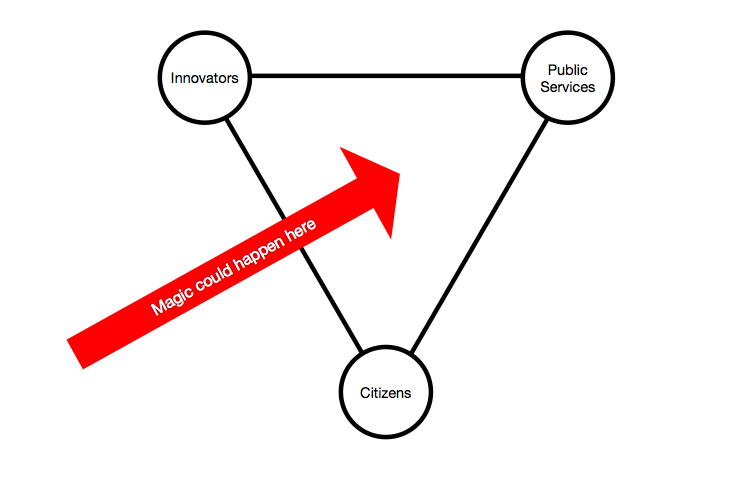Unusual Suspects, and triangles
It’s been really exciting to be part of #theunusualsuspectsfestival this week. Curated by Collaborate, Social Innovation Exchange, and Calouste Gulbenkian, the week has seen a free-flowing smorgasbord of workshops, fostering learning and connections between the network of agents who are passionate about using new methodologies to drive social change and better outcomes for the public.
On Wednesday Perrie and I went to Nesta and Cabinet Office’s People Helping People event, where we heard the new Minister tell charities to ‘stick to the knitting’ (eek), but were also inspired by stories of innovation ingenuity, success and learning from around the country. I was especially grabbed by Merseyside Community Rehabilitation Company’s work to embed service user voice in their new privatised probation service, and Liverpool Youth Offending Service’s partnership with Streetdoctors, where listening to young people led to a redefinition of the problem to be solved (from teaching young people how to put drunk friends in the recovery position, to supporting young people to cope with gun and knife crime). They were joined in a session on how to commission for social action by Chris Drinkwater of Ways to Wellness, a not-for-profit that, with the help of social investment, is contracting with the Newcastle West CCG to enable social prescribing, with delivery of services by non-traditional local providers. Chris argued strongly for local commissioning rather than attempting to scale up nationally, in order to leverage local credibility, assets and knowledge. And @JuliaSlay of New Economics Foundation asked the really killer Q: how do we change commissioning culture (hearts and minds, not just the technical process) to mainstream the idea of co-production and ‘people helping people’? (Ah! that’s exactly what we’re up to in Essex…)
A recurring theme for me throughout the day was the need to attend more explicitly to the permitting circumstances or system conditions necessary for social innovation to flourish as part of the public service landscape. I recalled some thinking I did AGES ago with wonderful Anthony Z from The Democratic Society, which became an extremely low tech presentation that we called ‘The Triangle thing’. The power relations between public servants, social innovators, and communities are unequal and contested. Each side of the triangle has problems in relating to the other two, and rarely do all three come together and pit their wits collaboratively in problem solving. Way back then, Anthony and I posed the possibility of curating a special space in the middle of the triangle, in which facilitation or brokering would enable all three to find equality of voice, shared vision, and the ability to harness collaborative intent and specialist knowledge and skills.
This challenge still feels very very relevant, and once I had mentioned it in Q&A with the Minister, the ‘triangle’ question seemed to rebound and recur throughout the day.
(A highlight for me was being referred to as ‘the Triangle Lady’ by the aforementioned Minister, a motif that for good or ill seemed to stick with other delegates. Though if I’m honest, it wasn’t quite as much as a highlight as catching up with the wonderful Rosie Farrar and the work of Spice)

